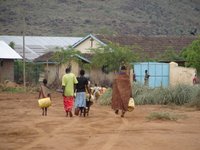Lekwongole, Pibor County.
Well, we made it here! But now it looks like we may not get out. After a rather crazy plane ride (we almost landed on the drop zone which the pilot confused with the landing strip) we arrived to the heat of Lekwongole. I found out that a good friend from Khartoum, Rebecca, was based here in 2003/2004 with Medair, until she was evacuated in 2004. It is a small world indeed. We are staying at the compound of an organization called COOPI, and there is a team of Kenyans, Ugandans and Sudanese working on agriculture, water and sanitation.
Pact gave me a tent, but when I tried to set it up, found that it has no fly! Fortunately COOPI had an extra one – especially as there was a huge rain storm our first night here – Lekwongole has turned into one huge mud pit – they also lent me rubber boots and so I’m keeping relatively dry. Now, if I could do something about the flies I’d be content.
Went to the local AIC church on Sunday morning, this is the church my parents worked within Kenya, so it was interesting to attend here – of course was in Murle, so didn’t understand much, but the singing and dancing was very lively! Met with the local administrators and the chiefs in the afternoon (in between rain showers) and then tried to drain the water from around my tent. Today (Tuesday) we have a whole slate of meetings with youth, women and the local peace committee. We are going to walk to one of the villages in the afternoon.
The Murle are interesting people, related to the Kalengin (I grew up in Kalengin area in Kenya) of Kenya, they are mainly pastoralist, but do some agriculture. They are a small group, but many were displaced in neighboring Ethiopia, Kenya and Uganda. The young people in particular speak good English learnt in the refugee camps. Many are coming back to the area. However, the traditional way of life is still quite strong. People still dress quite traditionally; many of the kids wear only beads, or nothing. I’ve been told that unlike some of the other groups (the Nuer to the north for example) the traditional respect for elders is still pretty strong, and that the “age mate” or generational groups are also strong. This is key in the peace work, as it is predominantly the youth who are continuing to do the cattle raiding between the tribes, and possibly the ones will resist the disarmament exercise that should happen in the next little while. The Chiefs have all agreed to comply with the disarmament process, but the key is whether the youth will obey them and indeed give up their arms. The Murle have been given a pretty bad rap by their neighbours, of being very fierce, and also have a reputation for abducting children, who are then adopted into the community. They admit that this has happened, but mainly in the past. On the whole they have proved to be extremely friendly and welcoming, and eager to talk about the peace process and their appreciation of what Pact has done in the community to help them re-establish relations with their neighboring tribes.
Things shut down when it rains here – we have been told that the road is impassable between here and Pibor town, our next stop which is just about 34 km away, and that there is a stream (Lilibok) that probably won’t go down for a couple of weeks. We have arranged for a vehicle to come up from Pibor and meet us on the other side of Lilibok tomorrow, and team here will take us to it by motorbike… however they are saying its chest deep, so not sure if that is an option – not sure I want to lug my laptop and camera across a river. It also rained in Pibor this morning, so I’m thinking that the road between Pibor and the river is going to be pretty bad, if its anything like up here. So we are effectively cut off by road, our options may be to walk or to fly – if the landing strip dries.
Funny thing here, when you ask people how far something is, they tell you in terms of flying time, not road – that is how non-existent roads are in S. Sudan. You really have to be able to afford to fly, or walk.
But, unbelievable, there is Internet access (minimal, can’t send files, so no pictures – although I have some fantastic ones), and I’m relatively dry, and its quite cool. When it rains we all sit around in the eating tukul and discuss politics. The atmosphere reminds me a bit of treeplanting days.





















